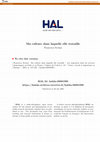Papers by Francesca Scrinzi
The Racialization of Sexism
La Découverte eBooks, Feb 22, 2021
Canadian Woman Studies, Jun 1, 2003
In Genoa, Italy, the Catholic Church plays a signtfcant role in the process of recruiting womenfi... more In Genoa, Italy, the Catholic Church plays a signtfcant role in the process of recruiting womenfi.om South America for domestic work in Italy. In this article, the author analyses issues of race, class andgender in the context of the Church ? involvement in the placement of migrant workers in Italian homes.
Journal of Immigrant & Refugee Studies, Dec 13, 2018
Based on qualitative data, this article focuses on management practices in social cooperatives op... more Based on qualitative data, this article focuses on management practices in social cooperatives operating as non-profit providers of domiciliary care services in Italy. Their livelihood is eroded by the presence of migrant live-in care-givers, who are privately employed, inexpensive and often irregular. This competition is not only economic but also symbolic, as it jeopardises the managers' attempts to define care work as a skilled job and reproduces notions of care as naturally feminine 'women's work'. The article analyses the strategies adopted by the managers in order to negotiate this competition, and shows how these challenge dominant gendered constructions of care work.

Feminist Review, Jul 1, 2011
This article aims to contribute to current debates about international migration and the restruct... more This article aims to contribute to current debates about international migration and the restructuring of the Welfare state in Europe, by highlighting the specificities of the French context. It draws on ethnographic research about the training of unemployed migrant women as domestic workers in Paris to address the ambiguities which underlie the enterprise of professionalizing domestic service. The qualitative data presented in the article show how essentialist ideologies operate within training practices of domestic workers. They reveal that the training practices challenge the association of the job with domesticity, but fail to acknowledge the racist organization of domestic service. Hence, they endorse essentialist constructions of cultural difference. Training practices are also consistent with current neoliberal policies and discourses on unemployment and 'employability', as they are framed by the normative reference to an entrepreneurial model of society. Finally, the data suggest that migrant women's experience of domestic service as a prospective job and their scepticism about the enterprise of professionalizing radically differ from the instructors' views.
Routledge eBooks, May 25, 2023
Routledge eBooks, May 25, 2023
Editions Karthala eBooks, 2011
http://www.feps-europe.eu/uploads/queries/2012_03/

N. Ribas (2001), « ¿Estrategias transnationales ? Una pregunta acerca de las migraciónes femenina... more N. Ribas (2001), « ¿Estrategias transnationales ? Una pregunta acerca de las migraciónes femeninas en España », Arxius de ciències sociales n°5; lire aussi P. R. Pessar (1999), « The role of gender, households, and social networks in the migration process: a review and appraisal », in C. Hirschman, P. Kasinitz, J. De Wind (eds), The handbook of international migration. The american experience, Russell Sage Foundation, New York. 2 B. Anderson (2000), Doing the dirty work? The global politics of domestic labour, Zed Books, London. 3 Eurispes (2002), Il lavoro domestico : sommerso e regolare, rapport de recherche, Roma; INSEE-DARES (1999), Les services émergents et l'emploi. 4 A. Morice (1997), « Quand la lutte contre l'emploi illégal cache les progrès de la précarité légale », in D. Fassin, A. Morice, C. Quiminal (sous la dir. de), Les lois de l'inhospitalité. Les politiques de l'immigration à l'épreuve des sans-papiers, Editions La Découverte, Paris. 5 E. Kofman, A. Phizacklea, P. Raghuram, R. Sales (2000), Gender and international migration in Europe. Employment, Welfare and politics, Routledge, Londres-New York. 6 S. Chaïb (2001), Facteurs d'insertion et d'exclusion des femmes immigrantes dans le marché du travail en France: quel état des connaissances?, document de travail élaboré pour la CFDT, non publié. 7 INSEE (2001), Recensement de la population de 1999. 8 Si les guillemets sont obligés, je préfère quand même utiliser le terme anglais qui fait référence aux études des féministes qui en Grande Bretagne et aux Etats Unis ont traité les connexions des rapports de genre avec les positionnements de classe et les statuts définis par la migration et la nationalité : K.-K. Bhavnani, ed. (1999), Feminism and « race », Oxford University Press. En France la production sur « genre, classe et ethnicité » a commence récemment à se développer.
Springer eBooks, Dec 21, 2016
The use of general descriptive names, registered names, trademarks, service marks, etc. in this p... more The use of general descriptive names, registered names, trademarks, service marks, etc. in this publication does not imply, even in the absence of a specific statement, that such names are exempt from the relevant protective laws and regulations and therefore free for general use.
This contribution was delivered on the occasion of the EUI State of the Union in Florence on 5 Ma... more This contribution was delivered on the occasion of the EUI State of the Union in Florence on 5 May 2016.This intervention was part of the recorded SoU afternoon sessions that took place on 5 May 2016 available on Youtube; move to the part of the video session of your interest within the video recording.Women migrants are often more vulnerable than their male counterparts – they face what is called the double disadvantage (of being both women and migrants). However migration, despite its economic and emotional costs, opens up new opportunities even for women who undertake low skill jobs, are undocumented, face discrimination or are exploited. This panel showcases how migrant women have oftentimes managed to turn the odds in their favour and highlight the factors that contribute to their empowerment and leadership











Uploads
Papers by Francesca Scrinzi